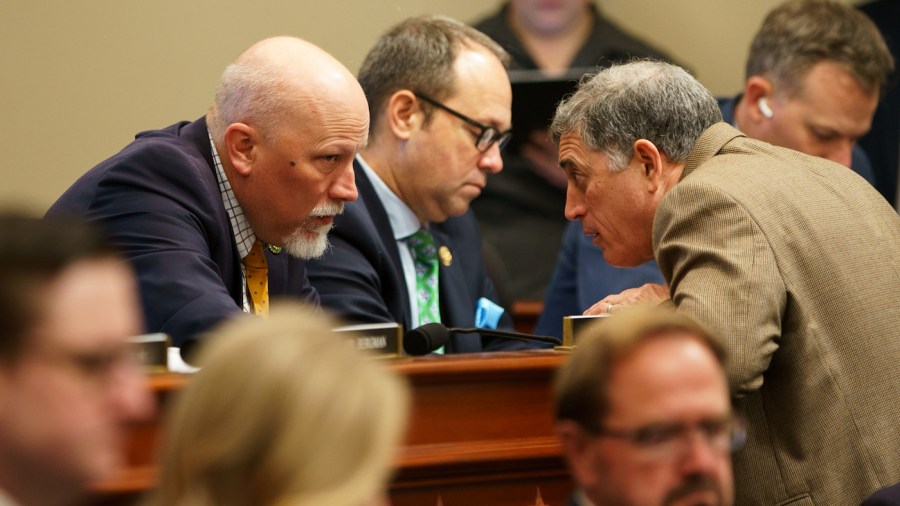
Hard-line conservatives and House GOP leadership struck an agreement on the conference’s budget resolution shortly before a key vote Thursday, putting the measure on a path to advance out of committee if it holds.
According to House Freedom Caucus Chair Andy Harris (R-Md.), the agreement — which still has to be approved by the House Budget Committee — would allow Rep. Jodey Arrington (R-Texas), the chair of the Budget committee, to “adjust the dials” and increase the cap on the deficit impact of the tax portion of the package of President Trump’s priorities if additional spending cuts are made in other areas. It would also give teeth to a $2 trillion deficit reduction target outlined in the bill that was key for fiscal hawks.
Harris said if the agreement, which would be brought up as a manager’s amendment, passes, the House Freedom Caucus will support the budget resolution — a serious boost to the House’s chances of approving the framework for “one big beautiful bill” of Trump’s priorities on the floor after weeks of hard-line conservatives jockeying over spending cut demands.
Advancing the budget resolution out of committee is the first step toward unlocking the process Republicans want to use to pass Trump’s legislative priorities without Democratic votes.
“This is it. We declare victory,” Harris said. “I mean, we have a bill that we believe that it had to be done rapidly to get the president the border funding as soon as possible. We believe it had that meaningful deficit reduction, and we believe it had to be able to advance the president’s tax policy. It all happens here.”
Arrington released a budget resolution Wednesday that outlines a $1.5 trillion floor for spending cuts across committees with a target of $2 trillion, a $4.5 trillion cap on the deficit impact of the Republicans’ plan to extend Trump’s 2017 tax cuts, and $300 billion in additional spending for the border and defense.
Conservatives, however, were in favor of additional spending cuts, while members of the Ways and Means Committee had pushed for a higher cap to enact Trump’s tax agenda.
Under the agreement, Arrington would be able to adjust the spending cuts floor and tax impact cap when crafting the budget reconciliation package. Harris said “the traditional mechanism of a reserve fund” will enable those changes to allow the chair to “adjust the dials.”
For example, with the deficit reduction floor set at $1.5 trillion and a target of $2 trillion, if committees find $2.5 trillion in reductions, Arrington can allow Ways and Means to design policies that raise its deficit increase allowance from $4.5 trillion to $5 trillion — enabling the committee more flexibility to address Trump’s demands for tax cuts.
Importantly, Harris said the amendment would also require the budget chair to lower deficit increase allowances for the tax portion if that $2 trillion target is not reached, meaning the allowance for tax cuts and other priorities would be curtailed.
The manager’s amendment already seems to be winning over some hard-liners on the Budget Committee, which is tasked with advancing the budget resolution as the first step in the reconciliation process.
Rep. Chip Roy (R-Texas), a member of both the Freedom Caucus and the Budget Committee, called the House GOP’s budget resolution a “giant step forward” in the markup Thursday, signaling that he will support the measure when it comes up for a key vote later in the day.
“This budget put forward by the chairman is a giant step forward to reduce spending, the primary driver of the inflation, and the expansion of the government largesse that is strangling the future of our children and grandchildren,” Roy said. “I am proud of what the chairman has put forward.”
Asked by The Hill what had changed overnight for the budget resolution to earn his support, the Texas Republican said “sufficient commitment to spending restraint has me optimistic I can support by day’s end.”
Roy’s comments mark a significant shift from Wednesday night, when the Texas Republican was holding out support for the resolution. Roy told reporters at the time that he still had questions on a number of matters including spending cuts, rolling back energy subsidies and the upcoming appropriations process.
Rep. Ralph Norman (R-S.C.), another Freedom Caucus member who sits on the Budget Committee, also appeared to be in position to support the resolution Thursday.
The South Carolina Republican told reporters Wednesday that he did not support the resolution in its current position, saying he wanted Medicaid work requirements and block grants to be on the table. On Thursday, however, he sounded optimistic the measure would advance out of committee.
Republicans are looking to use the reconciliation process to advance Trump’s legislative agenda since, if it is successful, it would allow the party to circumvent Democratic opposition in the Senate.
“I think, if everything goes well on amendments, we will get it passed out of the Budget Committee today,” he said.
Republicans can only afford to lose two GOP votes in the Budget Committee and still have their resolution advance, assuming all Democrats vote in opposition.
The manager’s amendment could also please Rep. Jason Smith (R-Mo.), the chair of the Ways and Means Committee, who had been pushing for a higher cap on the deficit impact of the tax portion of the bill since he did not think $4.5 trillion was enough to achieve all of Trump’s priorities.
“Let me just say that a 10-year extension of President Trump’s expiring provisions is over $4.7 trillion according to [the Congressional Budget Office],” Smith said earlier this week. “Anything less would be saying that President Trump is wrong on tax policy.”
Harris, though, said he had not talked to Smith about the deal.
Aris Folley contributed.












